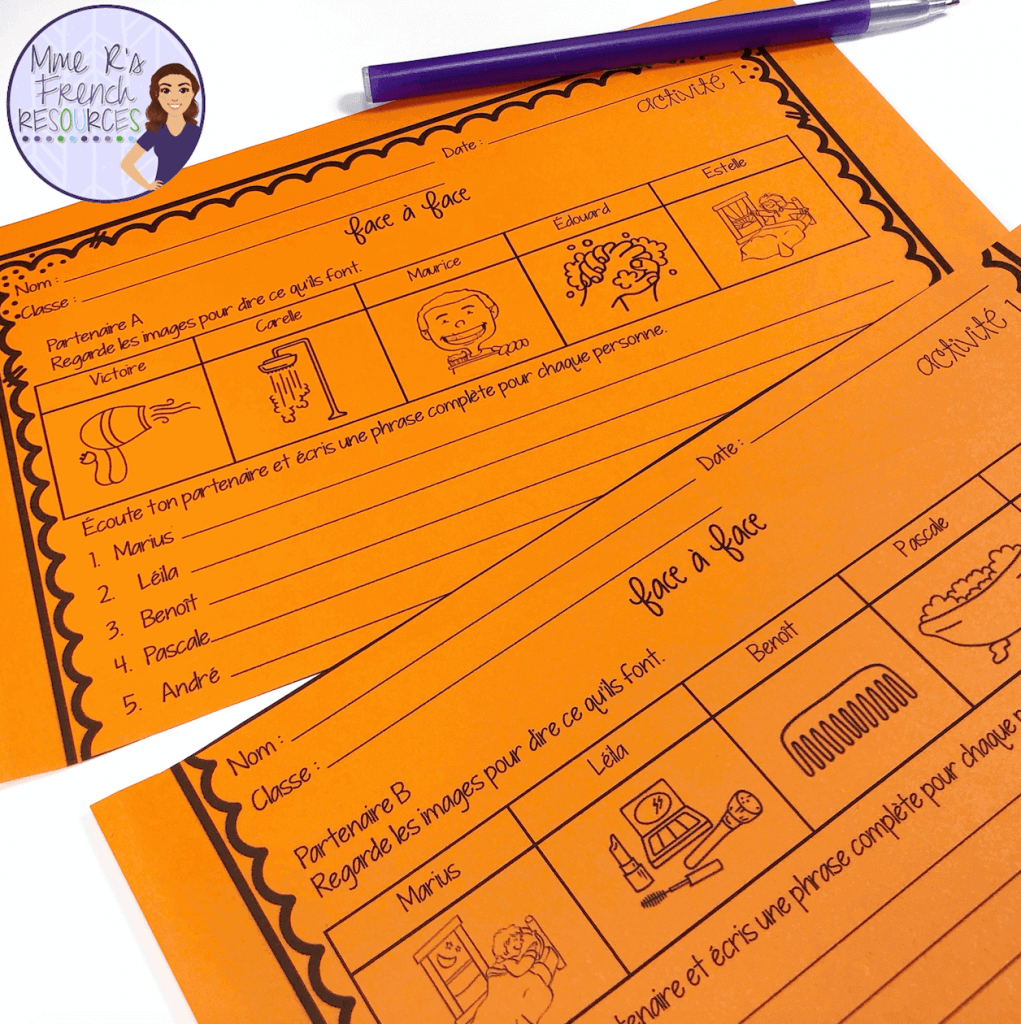
Teaching good oral communication skills is one of the most important tasks for the world language teacher. Getting students to speak French is often daunting, but doesn’t have to be! With meaningful practice and more focus on communication tasks, we can help our students become more effective communicators.
1. Practice should be interactive.
Of course students can do presentations that they have written out and prepared ahead of time. This is an important skill to have, too. However, to help them become effective communicators, they need to have a lot of opportunities to speak French in normal situations.
Simple question and answer speaking prompts are a great way to get beginners to speak French in an informal setting. Not every single activity has to be a structured, formal activity, either.
Want to improve their oral communication in French with an activity that takes no prep? Why not try a daily partner exchange? Just a simple turn and talk activity where students have to find something out about their partner, such as “Est-ce que tu as un animal de compagnie ?” Then, have a few students report on their findings. It is a quick and easy way to get them to speak French everyday.
2. It should focus on what they can do with the language.
Far too often, we worry about what students know about the language. We want them to use the correct structures, and we forget to focus on how well they are communicating. Yes, we want them to speak correctly, but we also want them to feel comfortable making mistakes.
The whole point is to communicate with another person, so we shouldn’t stress so much if they mispronounce a word or don’t use a grammatical structure perfectly. If we want them to speak French, we need to focus on if they can express themselves, not if the grammar is perfect.
We can correct their mistake subtly by repeating their sentence back correctly. For example, if a student says, “Madame, je n’ai pas un crayon,” we can ask, “Tu n’as pas de crayon ? Voici un crayon que tu peux emprunter.” They’ll hear the correct structure without feeling chastised.
By focusing on task-based instruction (TBI) we can help students become effective communicators through meaningful and authentic tasks. Examples of meaningful tasks might be ordering food in a restaurant, asking to try on clothing, or telling a doctor how he/she is feeling.
If you think about it, wouldn’t you want for your students to be able to go a French-speaking country and order a meal more than you would want them to be able to memorize a dialogue from your textbook?
3. Get them to speak French early and often in the class.
A lot of the time, we do our bell-ringers, then we do some direct instruction, then a little writing practice, and then, finally at the end of class, we do a little speaking time. Of course, after SO much information has gone into their brains, and especially if we are using the target language a lot, they are tired.
We monitor them so they don’t speak English. They know class is almost over. Some of them might try to start their homework. It’s just not very effective that way.
I made it a practice to do my speaking practice BEFORE any direct instruction (and maybe after, too). It’s an amazing way to review and get students in speaking mode before you teach. That makes it easier to get them to speak French, helps them get in French mode, and gets them using the language orally before they are too overwhelmed and tired to try.
Here’s how it might look:
Start class with a bell-ringer (or however you like to begin).
Now try out that daily partner exchange. It can be a follow-up question relating to your bell-ringer, too.
Next, use a structured speaking activity to review verbs and vocabulary from your unit. You might use a Find Someone Who activity, speaking cards, or even a partnered activity like this one from my French reflexive verbs packet.

After students have had some time to speak French, then do your direct instruction and give them a few minutes of written practice. I strongly feel that students should be doing a LOT of speaking and interacting in class.
Written practice can be a great way to start and end the class, but the more they are speaking, the better they’ll get at it. Just like anything else, the ability to speak French gets better with regular practice.
4. Practice with common phrases.
Dedicate a spot in your room to post common phrases that students will often use for your unit of study. You could print them out and hang them if you’ll be using them for a while, but it’s also fine to just write them on your board and leave them for a week or two.
Ask a lot of questions that would require students to use those phrases in their responses. Give them plenty of ways to respond to them, such as orally with a partner, on a written exit ticket, during a class survey activity, or as a spoken exit ticket on their way out the door.
Help them memorize these structures, because a big part of learning to speak French well means that you can use the language even without explaining the grammar behind it. Let’s face it… those people out there who don’t love grammar can still correctly use direct object pronouns in their native language, even if they don’t know what that is! With the right practice, it can be this way for a second language learner, too.
5. Build confidence with level-appropriate tasks.
A lot of times, I think textbooks move WAY too fast and ask far too much for the level the students are actually at. French 2 students are often working with some complicated structures (such as the passé composé, direct and indirect objects, then suddenly they need to use them all together in one sentence! 😫), but we have to remember that they are still in the novice range.
If we want them to speak French, we need to provide tasks designed for the student level. They can learn complicated structures, for sure, but they don’t have the vocabulary yet to discuss ideas in detail. It’s hard enough to remember all these structures, understand a speaker, formulate sentences, and then worry about pronouncing them correctly!
For the students’ first two years of study, they should be expected to respond to direct questions. They probably will rely a lot on those common phrases you put up in your room as they speak French, and that is okay. This helps them memorize structures without the need to understand the grammar behind it. This is one reason why I teach students “Je suis allé” even before the avoir passé composé verbs. Better to teach a super-common exception before they begin to practice it incorrectly, right?
For more information on proficiency levels, you can check out these tables for the CEFR levels (Common European Framework of Reference for Languages) or the ACTFL Performance Descriptors for Language Learners.
As teachers, we can do a lot of little things to help our students speak French with confidence. We don’t have to completely change everything, but implementing a few of the changes above can help our students get more comfortable with everyday conversation and become better French speakers.


Leave a Reply